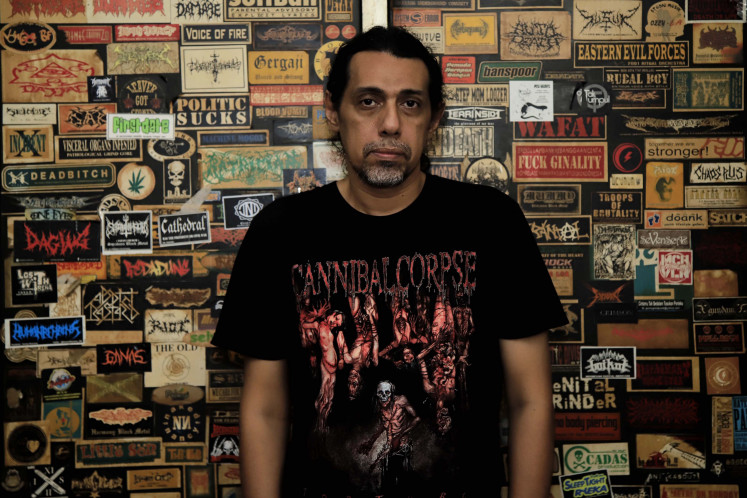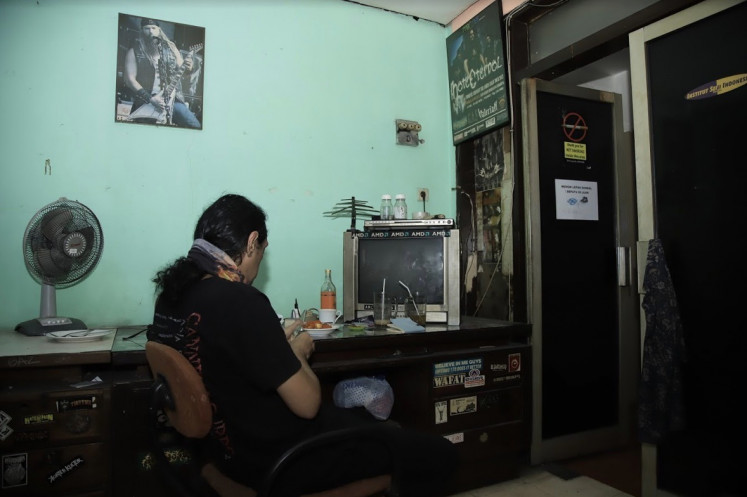Popular Reads
Top Results
Can't find what you're looking for?
View all search resultsPopular Reads
Top Results
Can't find what you're looking for?
View all search resultsInferno: The underground studio that helped launch Surabaya’s heavy metal scene
As the pandemic ravishes music studios, The Jakarta Post visits one of the country’s most influential - one considered the birthplace of heavy metal music in East Java.
Change text size
Gift Premium Articles
to Anyone
T
he music of British metal band Napalm Death was reverberating loudly from a speaker when The Jakarta Post arrived at Inferno studio in the Dharmahusada area of Surabaya. The studio’s windows and walls were covered in stickers and posters of various metal bands. At the end of the hallway, a long-haired man was listening loudly to music.
That man is Samier Abdullah Talib, a member of influential metal bands Tengkorak and G.A.S 178. Whenever he is not busy playing gigs, Samier usually spends his time in the studio that he built more than two decades ago, in 1997, right before the financial crisis hit Indonesia.
Samier started the studio, which soon became the center of Surabaya’s metal scene, when he was 23 years old (he is now 49). At the time, he was not interested in continuing his studies. He quit college and set up the studio in his parents’ house. “It was my intention all along to be a musician wholeheartedly. Even though fate said otherwise, never once have I ever regretted that decision,” said Samier.
When the financial crisis hit Indonesia, most studios in Surabaya closed access to metal and punk bands for rehearsals because those bands would allegedly break instruments quicker due to their hard playing. A sticker stating “No Underground” was stamped on the front door to deter those bands from trying to book a session. Inferno was the only studio that opened the door to underground bands. According to Samier, that was the main factor that made his studio a monument for metal music in Surabaya.
“When other studios rejected underground bands, Inferno became very busy. Our schedule was always packed, and you would need to make your bookings one to two weeks prior to get a slot,” Samier said with a laugh.
During the early days of Inferno, Samier made a counter-discourse against studios that discriminated against underground musicians or bands. “I put up a huge “No Pop’” sticker. Then, everyone thought it was serious, and it strengthened the image of Inferno as an exclusive place for metalheads. Although I did it for fun,” he said.
Inferno had a strong attachment to underground music, which then gave birth to the pioneers of Surabaya's bands that breathe extreme music. Seasoned bands like Brutal Torture, Wafat, Slowdeath and Dry, started their career there. A scene was soon born and developed.
Quiet studio
When the pandemic hit Surabaya, almost its entire entertainment industry, including rehearsal studios, crumbled. Usually a hotbed for classic rock and heavy metal gigs, there has not been a single musical performance in Surabaya for almost a full year.
“That’s the main reason why the studio’s gone quiet,” Samier said, adding that many other studios now also accepted rock bands, making Inferno one of many.
Samier founded the influential rehearsal studio Inferno as a young man after dropping out of college to focus on music. (JP/Sammuel Christ K.A)
Even though Inferno was initially recognized as the headquarters of Surabaya’s metal scene, Samier has taken down the iconic “No Pop” sticker. As a result, more diverse bands now use Inferno studio.
“Well, [the clientele] is random now,” laughs Samier. Sometimes, the studio will have students practicing music with their teachers.
“But since the pandemic, they no longer attend offline classes. So, no more bookings,” he explained, adding to the challenges faced by the studio.
Even though his income is in freefall, Samier has no plans of shutting down his studio.
From hard rock to comic books
To keep Inferno running, Samier rents out parts of the land around the studio for coffee shops and street food to make extra income. Additionally, as physical releases are no longer promising, he started to sell comics made by local artists and publishers. They can be seen on the display shelves.
“This is a nostalgic business. Aside from collecting cassettes and CDs, I’m also a huge fan of comics. Therefore, I would like to try to help the distribution of local comics. Actually, in terms of the story line and illustration quality, recent local comic artists are much more skillful than they used to be,” he explained.
As for the marketing strategy, Samier handles comic books just like his music releases. He refuses to serve online sales. He wants his buyers to come to the shop. He admits that aside from wanting to promote the joy of a physical purchase, he would like to talk to people to learn about the comic industry. Despite the slow sales, Samier believes he can help the local comic industry reach its glory, just like he did for the underground music scene. He wants to encourage them to be more ambitious.
Samier inside Inferno, a rehearsal studio that bred many of Surabaya's most-popular underground metal acts. (JP/Sammuel Christ K.A)
“[Publishers and comic writers] only print a few [comics] and are satisfied with that. I’m planning to meet up with them, one by one, and we’ll discuss and find out the reasons for their lack of confidence,” Samier said.
As he approaches 50, Samier finds himself complaining about how he is no longer able to stand for a long time. But in terms of his spirits, Samier still feels the sparks and he’s always eager to talk rock music.
“Honestly, I don’t know how long I will last. Getting older here in Surabaya does not seem like a bad idea. I would be happy to see the birth of a new generation in our [creative] scene. Yes, it would be as enjoyable as listening to Napalm Death’s new album. By the way, do you like Uriah Heep? Their new album is genius!”












